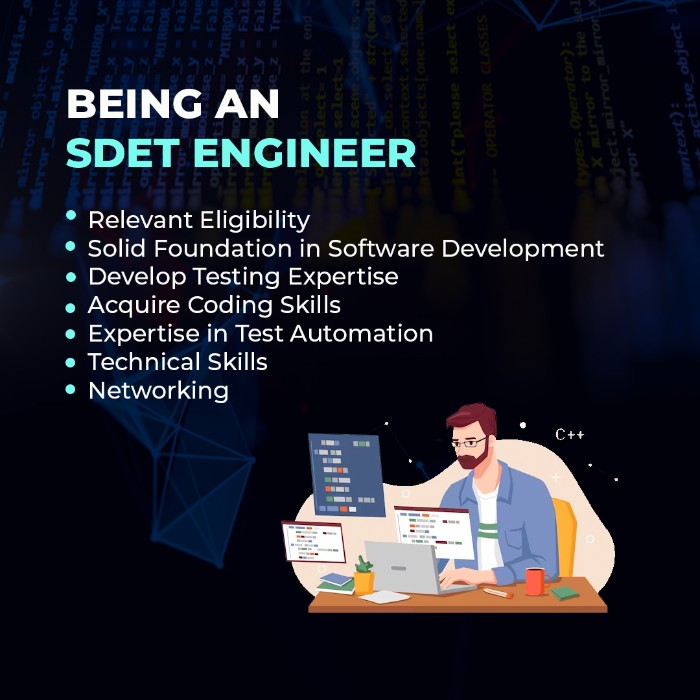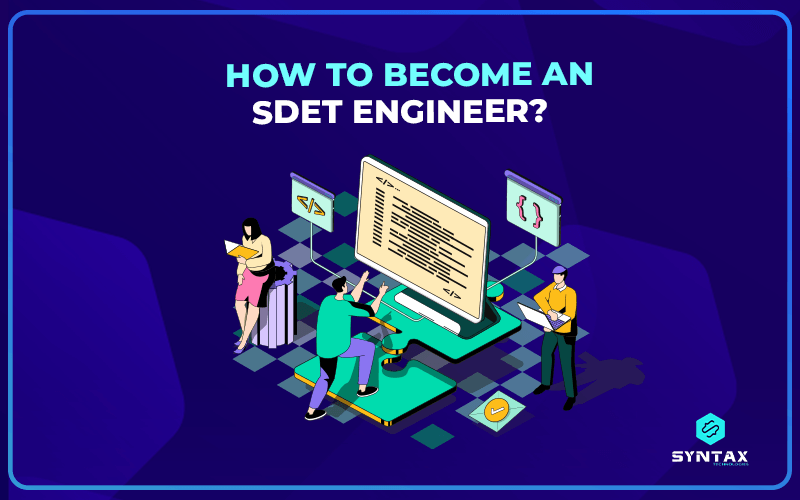In the rapidly evolving landscape of software engineering, the demand for professionals who can effectively bridge the gap between development and quality assurance has never been higher. Enter the world of Software Development Engineer in Test (SDET), a role that combines the skills of a software development engineer with the meticulous mindset of a manual tester.
What is an SDET Engineer?
SDET engineers are instrumental in ensuring the delivery of high-quality software products by designing and implementing robust testing frameworks, automating test cases, and collaborating closely with developers and quality assurance teams. They play a pivotal role in writing test scripts, working alongside manual testers, and utilizing their expertise as a testing automation engineer throughout the software development life cycle.
If you have a passion for both coding and quality and aspire to become a professional who stands out in the realms of both software developer engineer and manual tester, aiming to streamline the automated testing processes and enhance the efficiency of the development team, this blog will guide you through the essential steps to become a skilled QA Automation engineer.

Education and Eligibility
To become an SDET Engineer, you usually need a Bachelor’s degree in Computer Science or a related field with at least 3-4 years of experience in software development and testing. Additionally, knowledge of programming languages such as Java and Python is essential for this role.
Furthermore, expertise in test automation tools such as Selenium WebDriver and other testing frameworks like JUnit/TestNG are highly desirable. Familiarity with databases and scripting techniques will also be beneficial.
Employers may also value certifications in relevant areas such as software testing or test automation. While formal education is valuable, practical experience through internships, projects, or professional experience in software development or quality assurance can also greatly enhance an individual’s eligibility as an SDET Engineer.
As the SDET job involves managing both technical and non-technical tasks, excellent communication skills are important to collaborate effectively with developers and testers.
Build a Solid Foundation in Software Development
Having a good understanding of the software development process and best practices is essential to becoming an SDET Engineer. One should learn a programming language and establish a strong foundation in software engineering principles such as object-oriented programming, design patterns, data structures, algorithms, coding standards, database design & optimization. This will provide you with the technical skills needed to develop test frameworks effectively.
You should also understand popular software development methodologies such as Agile and Scrum and be familiar with various development test tools such as source control systems (e.g., Git/SVN), bug tracking systems (e.g., JIRA), continuous integration (CI) technologies like Jenkins or TeamCity, etc.
Develop Testing Expertise
A key part of becoming an SDET Engineer is understanding and mastering various software testing techniques. You should become familiar with the fundamentals of test design, such as unit testing, integration testing, smoke tests, performance testing etc. Understand how to write clear, concise, and reproducible test cases with well-defined inputs, expected outputs, and test conditions.
It’s also important to have a good working knowledge of test automation tools like Selenium WebDriver and be able to build robust frameworks that can efficiently automate regression tests with minimal maintenance costs. Furthermore, having an understanding of continuous integration (CI) processes will help in developing efficient automated test suites.
Acquire Coding Skills
In order to become an SDET Engineer, it is essential to be able to write code. An understanding of programming concepts such as variables, data types, loops, functions and classes will help in building efficient test frameworks. Acquiring coding skills in languages like Java or Python will allow you to better implement automation tools and develop testing frameworks that are both effective and maintainable.
Expertise in Test Automation and Continuous Testing
Test automation is a critical skill for automation engineers as they are responsible for developing and maintaining test frameworks that automate the execution of tests with minimal maintenance costs. An understanding of popular test automation tools such as Selenium WebDriver, Appium and others along with scripting skills in languages like Java or Python will enable you to write robust automated tests. Additionally, knowledge of continuous integration (CI) processes and technologies such as Jenkins or TeamCity will help in efficiently integrating automated tests into the CI pipeline.
Sharpen Your Technical Skills
Apart from coding skills and expertise in software testing and test automation, there are other technical skills that can be valuable to get hired as an SDET Engineer. It’s important to have a good understanding of databases such as Oracle, MySQL, and NoSQL and the ability to write SQL queries. Additionally, knowledge of web development technologies like HTML/CSS/JavaScript can also be beneficial.
Networking and Communication Skills
SDET Engineers need to collaborate closely with developers, quality assurance teams and other stakeholders in order to ensure that software products meet customer requirements. As such, having strong networking and communication skills is essential for SDET Engineers in order to build a successful career in this field.
Articles you may like
How to Move from being QA to SDET?
Top 25 SDET Interview Questions
Conclusion
Becoming an SDET Engineer requires a combination of programming skills, software testing expertise, test automation capabilities, and technical proficiency. A solid education in Computer Science or related fields, along with at least 3-4 years of experience in software engineering or quality assurance roles, can help an individual to become a successful SDET Engineer. Additionally, expertise in relevant tools and technologies like Selenium WebDriver and CI processes are also essential for this role. Lastly, strong networking and communication skills are important for collaborating effectively with other stakeholders.
We at Syntax Technologies provide exceptional opportunities to develop skills in QA Automation Testing and stay ahead of the tech curve. Enroll today.


